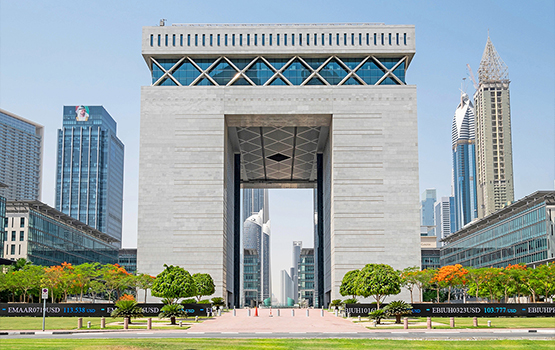_HOW WE REGULATE
In fulfilling its mandate as the sole independent financial services regulator for the DIFC, the DFSA performs a number of functions.
- Policy and Rulemaking
- Authorisation
- Recognition
- Supervision
- Enforcement
- International Co-operation
The DFSA’s stated approach is: “To be a risk-based regulator and to avoid unnecessary regulatory burden”. We believe regulation should be directed to the mitigation of risks that would otherwise be unacceptable. We also believe that compliance obligations should be proportionate to the mitigation of those risks within a framework that enables regulated entities to effectively and efficiently meet their compliance obligations.
Under this model, we set priorities for the use of our resources and have adopted a continuous risk management cycle which identifies, assesses, prioritises and mitigates unacceptable risks to our regulatory objectives or a particular sector of our financial services industry. We recognise that these risks may arise from within or outside the DIFC so we regularly monitor regional and international financial markets and trends. This systematic assessment of risk allows us to identify common issues across our regulated community and to undertake necessary thematic work in response.
Our risk-based philosophy applies to all divisions of the DFSA and all our dealings with regulated entities. We believe that focusing more on outcomes rather than the way they should be achieved, results in more effective and efficient risk-based regulation.
The DFSA believes that it is appropriate to clearly and regularly state our approach to regulation to ensure it is clearly understood by all external and internal stakeholders. Our Approach to Regulation together with the DFSA Vision, Mission and Values form the foundation upon which we do our work.
Policy and Rulemaking.
The Regulatory Law 2004 gives the DFSA Board of Directors the general power to make rules regarding all matters that are related to our objectives, powers and functions. The rulemaking process normally includes a period of public consultation which gives interested persons the opportunity to comment on the proposed rules. We consider these comments to be a valuable input. Our rulemaking power also allows us to respond quickly and efficiently to matters, trends and events affecting the DIFC
INTERNATIONAL CO-OPERATION
To achieve our objectives, the DFSA fosters and maintains relationships with other regulatory agencies within Dubai and the UAE, as well as with international bodies, regulators and organisations. For ease of access, a number of links to local registers, the DIFC's two exchanges, DIFC Court decisions, local and English language news sources and telephone directories are provided here.
In the context of non-public information, the DFSA actively pursues alliances and the creation of Memoranda of Understanding with local, national and international bodies, authorities and organisations. These Memoranda facilitate the realisation of the DFSA’s objectives and guiding principles, which include co-operating with and providing assistance to authorities, bodies and organisations in the State and other jurisdictions. In particular, these Memoranda facilitate the way in which regulators can assist each other in the pursuit of individual and common objectives, including through the exchange of information and the use of enforcement powers.
MoUs signed by the DFSA
The traditional mechanism for formalising co-operation between regulatory authorities in different jurisdictions is a bi-lateral Memorandum of Understanding (MoU).
An MoU provides a formal basis for co-operation between regulatory authorities, bodies and organisations, including for the exchange of information and investigative assistance, based on existing laws. This means it cannot make lawful a release of information that would otherwise be unlawful, nor can it compel assistance that can only be voluntary.
It should be noted that the lack of an MoU is no impediment to sharing information and providing assistance to a fellow regulator as the DFSA's authority to share information and assist is based on specific provisions in the Regulatory Law. Chapter 8 of the DFSA Regulatory Policy and Process (RPP Sourcebook) elucidates further on the DFSA exercising powers on behalf of other authorities and sharing information with domestic and foreign regulators, bodies and organisations.
INTERNATIONAL ASSESSMENT
From time-to-time, international standard setting and oversight bodies, conduct assessment of the DFSA’s regulatory regime. Our aim is to create an environment that is on par with international standards of regulation and represents a best-of-breed of best practices.
IMF and World Bank FSAP
The International Monetary Fund (IMF) and World Bank jointly conduct periodic Financial System Stability Assessments (FSAP) of member states, typically on a three to five year cycle. The purpose of the Assessments is to ensure that a jurisdiction's regulatory and supervisory systems and practices contribute to financial stability. In that regard, the IMF assesses financial regulators' quality and performance, and conformity with recognised international best practice.
There are three oversight bodies that prescribe minimum standards for the Banking, Insurance, and Securities sectors: the Basel Committee on Banking Supervision (BCBS), the International Association of Insurance Supervisors (IAIS), and the International Organisation of Securities Commissions (IOSCO).
The IMF completed an FSAP of the United Arab Emirates on July 27, 2007, with a public report, issued on October 31, 2007. The UAE FSAP included a separate assessment of the DIFC, a separate jurisdiction within the UAE, and the DFSA. The IMF considers the DIFC to be an on-shore jurisdiction.
The FSAP Report states, in pertinent part, that "...the legal framework governing commercial activity in the Centre is well developed, with highly-skilled supervisors and a strong monitoring system in place." Further, the DIFC "...has well defined regulatory and supervisory systems that are on a par with other regional financial centers (such as Singapore and Hong Kong)."
The FSAP included a separate "Detailed Assessment of Observance of IOSCO Objectives and Principles of Securities Regulation". The IMF concluded that "The DFSA has established a very impressive set of laws, regulations and rules and policies and procedures for regulation. Its staff is well qualified and work to international best practice standards."
The assessment considered 29 of the 30 IOSCO Principles (one Principle pertaining to payment systems was not applicable), and concluded that the DFSA had "Fully Implemented" 27 Principles and has "Broadly Implemented" the remaining two Principles.
The FSAP did not include a detailed review of the DFSA's implementation of the BCBS Core Principles for Effective Banking Supervision or the IAIS Core Principles due to the developing nature of those business sectors in the DIFC at the time of the on-site assessment (early 2007). Accordingly, and in line with international best practice and transparency, we have performed self assessments of adherence to those standards. The self assessments, below, reflect that the DFSA substantially meets these international standards.
.



